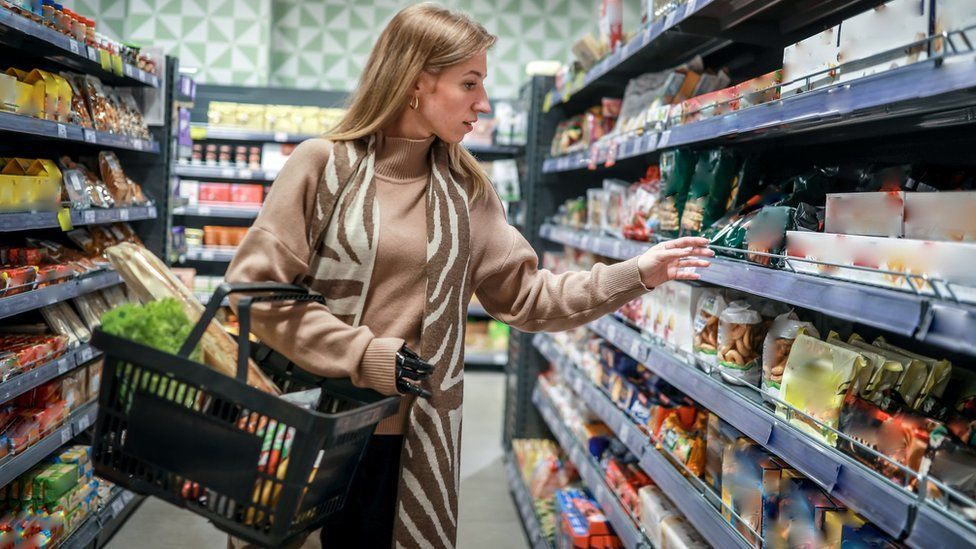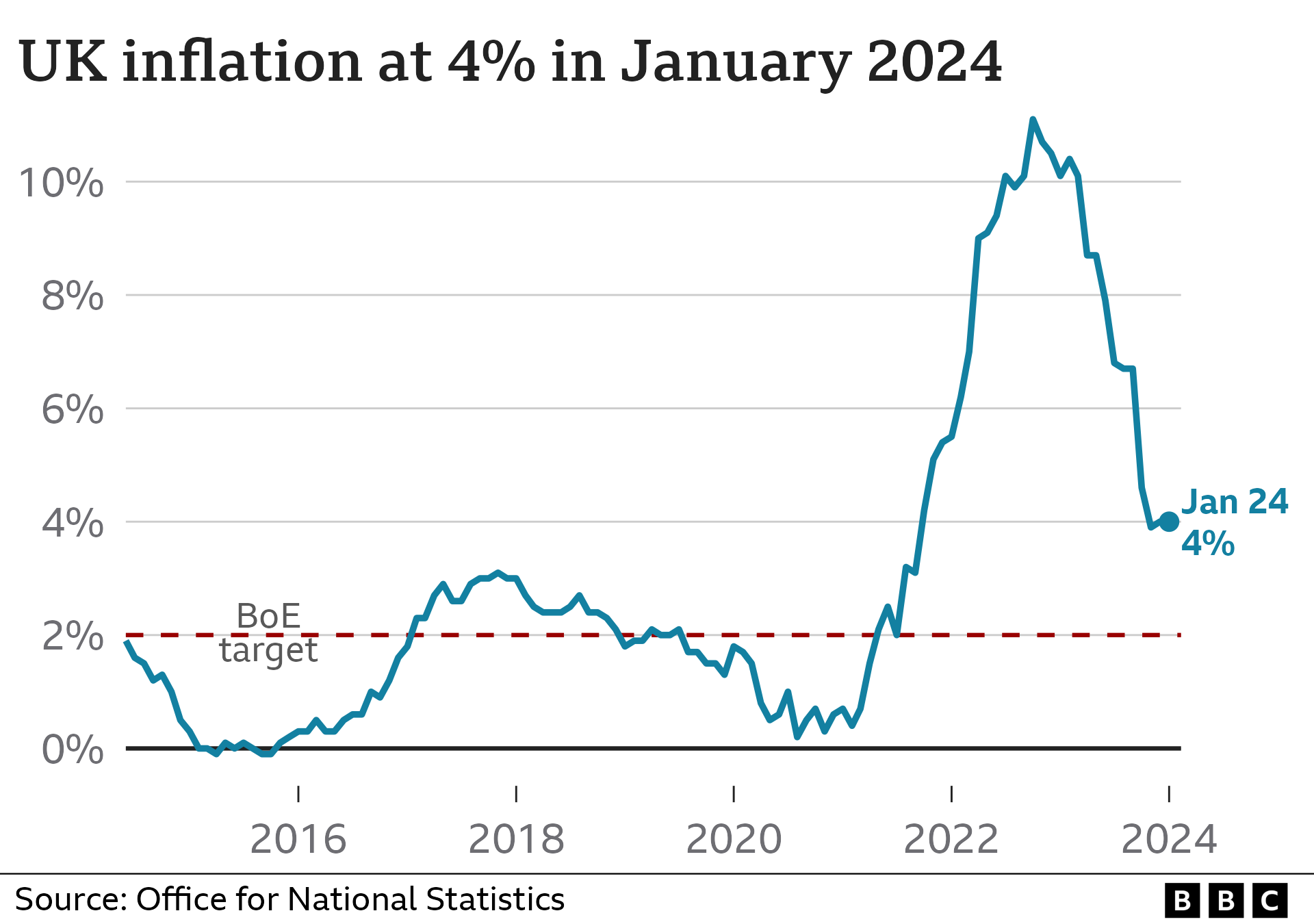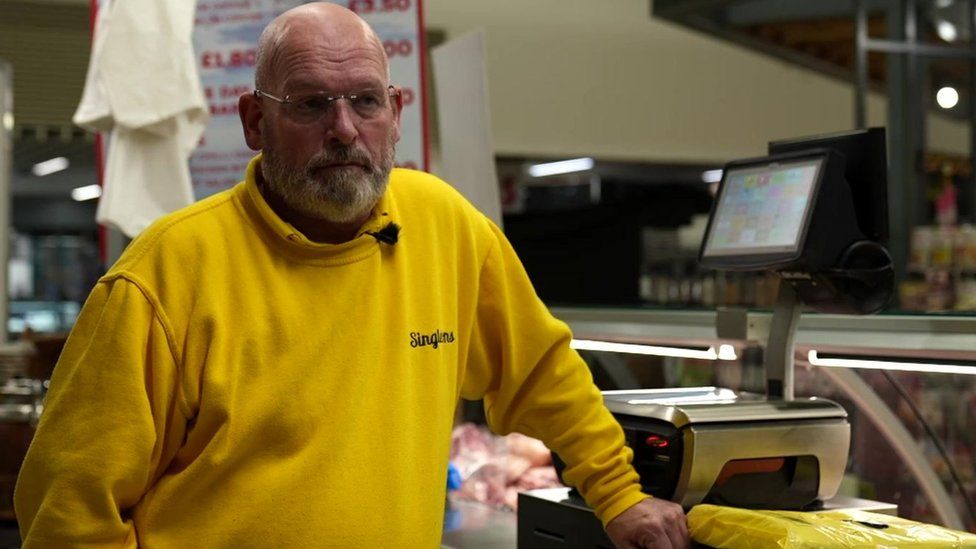
The UK's inflation rate remained unchanged in January, despite the first monthly fall in food prices in more than two years, official figures show.
Inflation, which measures how prices rise over time, was 4% last month.
The number surprised experts who had expected a rise in energy bills to push prices up at a faster rate.
However, the monthly drop in the price of food, including items such as crackers, cake and crisps helped offset the rise in electricity and gas costs.
The 0.4% fall marked the first decrease in more than two years, with cooking sauce and instant coffee costs also easing.
Slower price rises for many furniture and household goods also helped keep inflation lower, as retailers offered big discounts in a bid to clear the shelves after disappointing sales in the run-up to Christmas.
Overall, food prices are still relatively high, however, with sharp rises seen in the past two years.
Prices rose sharply after Russia's invasion of Ukraine, which had a big impact on energy prices and grain supplies. Bad weather in Europe and North Africa and labour shortages in the UK have all affected crops too.
Housing and household services, including gas and electricity charges, made the biggest upward contribution to inflation with the typical annual household bill now £1,928, a rise of £94, since January.
The price for second-hand cars also rose by 1.5% between December 2023 and January - the first rise since last May.

Rishi Sunak insisted the "economy has turned the corner and we're now pointing in the right direction".
Speaking at a business council meeting, the prime minister said inflation had now more than halved and that mortgage rates were starting to come down.
Despite the fact the figures on Wednesday beat economists' expectations, inflation still sits far above the Bank of England's target of 2%.
With inflation remaining much higher than this, the Bank has increased interest rates to 5.25%.
The theory is that by making borrowing more expensive, people will have less money to spend. They are also encouraged to save more as saving rates increase. In turn, this reduces demand for goods and slows price rises.
'If you make it too dear, they won't come'
Gareth Jones, the owner of family-run Singleton Jones delicatessen in Warrington Market, said customers' shopping habits had changed.
"The ones that haven't got a lot of money are having to watch it because they're really scraping by because of the price of heating their home, transport, cars."

He told BBC News that price rises from his suppliers put him between "a rock and a hard place".
"If I move my prices up, I've got to sell it to someone. And if you make it too dear, they don't come in."
Figures on Tuesday showed that pay was still going up faster than prices.
Myron Johnson, senior personal finance analyst at Interactive Investor, said there was a sense of optimism going forward.
"For many, the cost of living burden on their finances doesn't feel as acute. But many workers haven't been so fortunate and continue to be weighed down by elevated costs."
Following the latest inflation number, analysts increased bets that the Bank of England would cut interest rates from June.
But analysts urged caution pointing to steady core inflation, which strips out the effect of items that can be more volatile, such as energy costs, alcohol and tobacco. Service costs, which include housing services such as rent, repairs, sewage collection, house contents insurance and repair of household appliances and council tax also rose.
Former deputy governor of the Bank of England, Sir Charlie Bean, suggested the Bank would probably not make a lot of the latest inflation figures.
He said that he would be "very surprised to see the Bank lowering interest rates" until pay growth eases too.
And while the "headline" inflation figure for January remained unchanged from the month before, prices are still rising.
Shadow chancellor Rachel Reeves made that point in response to the latest update: "Inflation is still higher than the Bank of England's target and millions of families are struggling with the cost of living."

How can I save money on my food shop?
- Look at your cupboards so you know what you have already
- Head to the reduced section first to see if it has anything you need
- Buy things close to their best before date which will be cheaper and use your freezer
Read more tips here.

Related Topics
https://news.google.com/rss/articles/CBMiLGh0dHBzOi8vd3d3LmJiYy5jby51ay9uZXdzL2J1c2luZXNzLTY4Mjg1ODE50gEwaHR0cHM6Ly93d3cuYmJjLmNvLnVrL25ld3MvYnVzaW5lc3MtNjgyODU4MTkuYW1w?oc=5
2024-02-14 12:33:37Z
CBMiLGh0dHBzOi8vd3d3LmJiYy5jby51ay9uZXdzL2J1c2luZXNzLTY4Mjg1ODE50gEwaHR0cHM6Ly93d3cuYmJjLmNvLnVrL25ld3MvYnVzaW5lc3MtNjgyODU4MTkuYW1w
Tidak ada komentar:
Posting Komentar